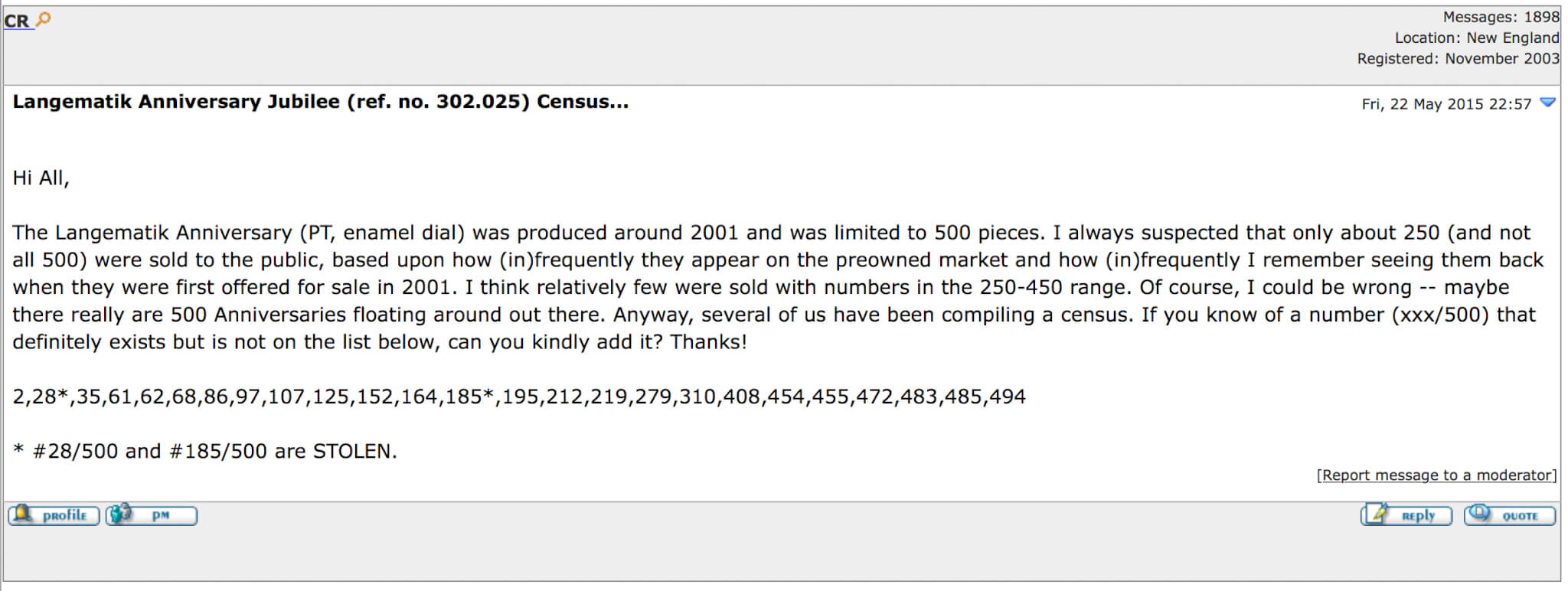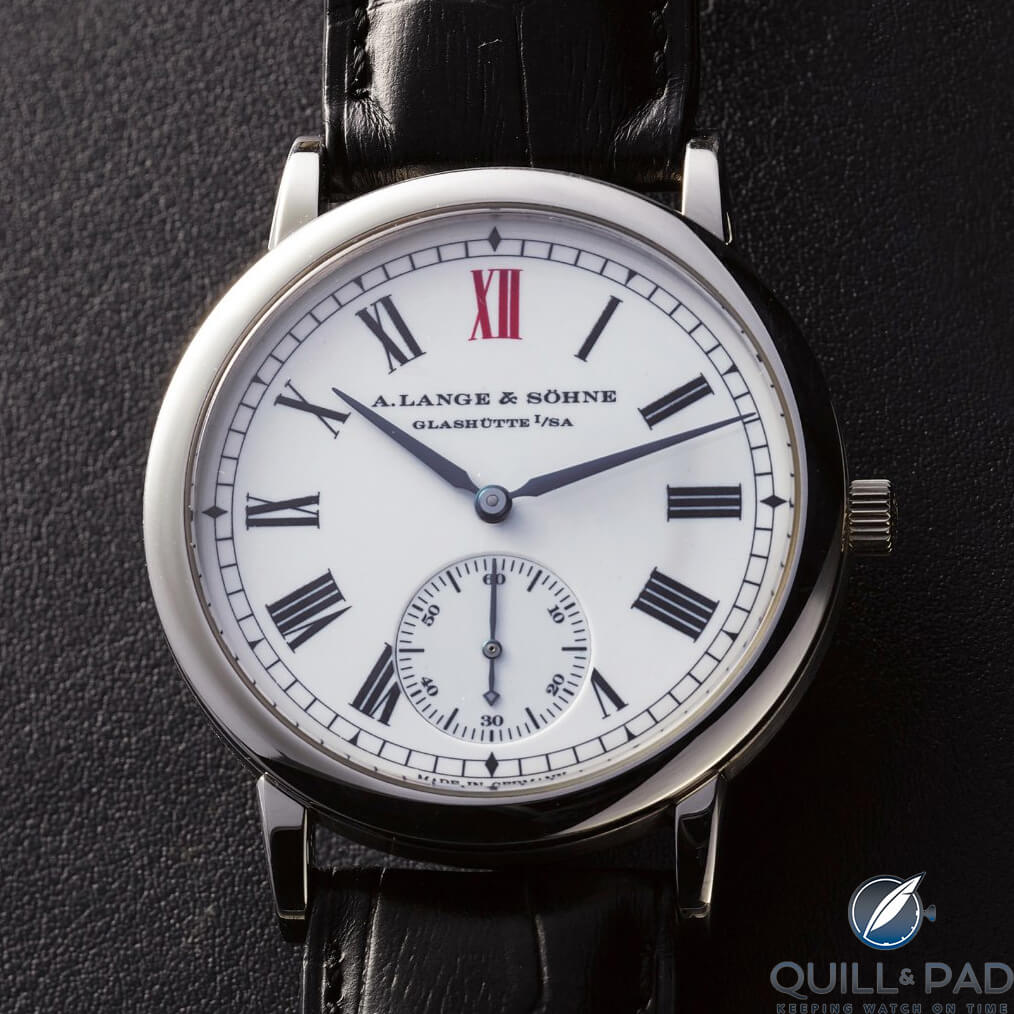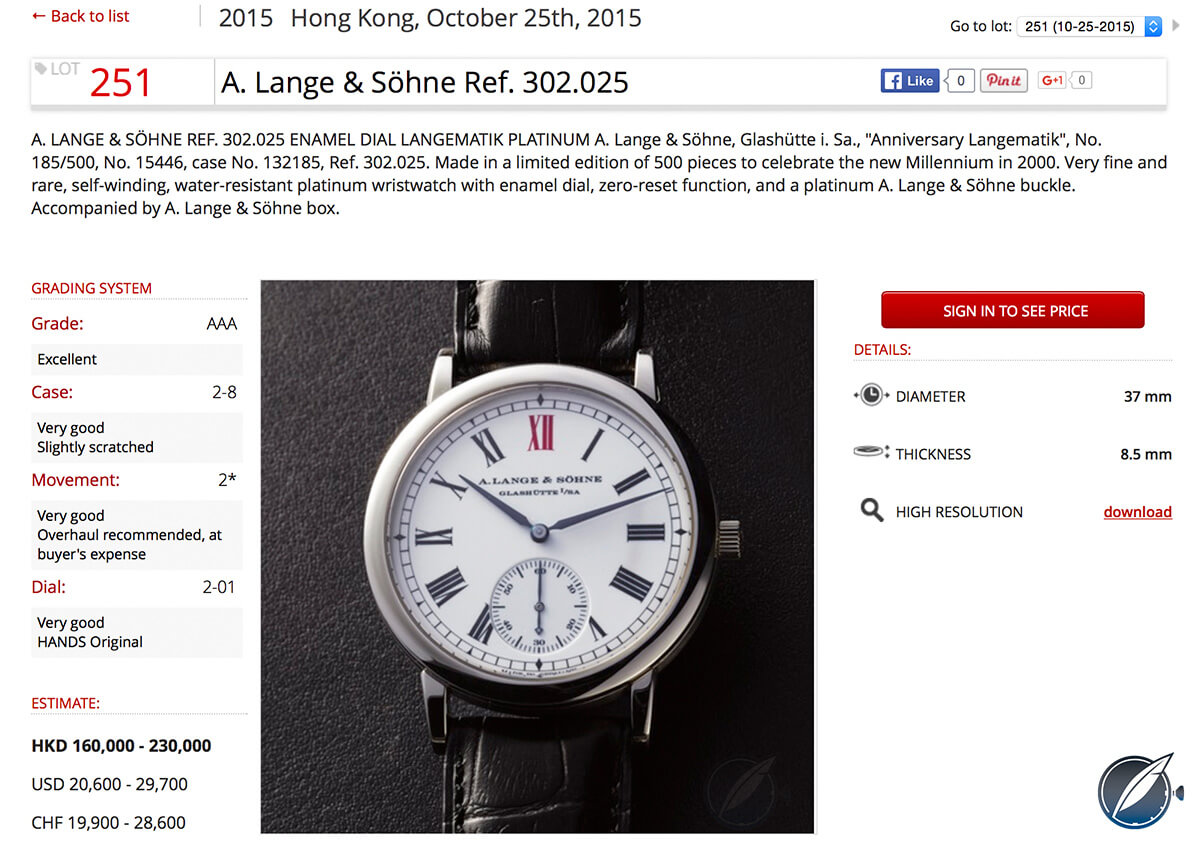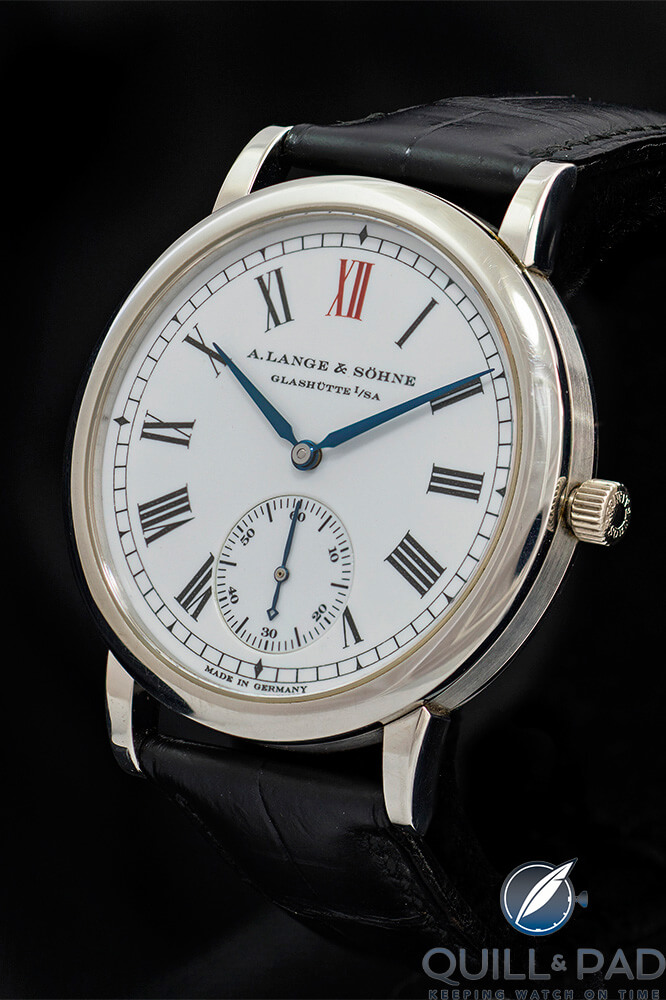by GaryG
Conditions of sale, Antiquorum Hong Kong, June 2015: “Antiquorum confirms no ability or obligation to perform due diligence on any lot.”
Imagine one of the worst things that could happen to you as a watch collector: your home is invaded by robbers and your entire collection is spirited away.
Thankfully, when you rush home you find your family shaken but safe, but your collection of special watches built up over many years is gone; only the boxes and papers remain.
You call the police and fill out crime reports, and you spread the word of your loss on major watch forums, through friends who maintain registries of some of the watches in question, and with the manufacturers themselves.
And then you wait, hoping that some of the watches will eventually emerge so that you can reclaim them.
Well, this scenario actually happened to a good friend of mine, Nicolas, who is for me the living definition of the term “enthusiast collector.” Nicolas is the long-time moderator of the Jaeger-LeCoultre forum on PuristsPro, and in a little over nine years in this position he has contributed a mind-boggling 115,000 posts – and counting.
On January 18, 2011, Nicolas was at SIHH when word arrived of the break-in at his Paris home; over the next several years, he continued to dispense his infectious brand of watch enthusiasm while occasionally ruing the loss of his pieces until one day a ray of light emerged. At its October 25, 2015 auction, Antiquorum had sold one of Nicolas’ watches: the A. Lange & Söhne Langematik Anniversary watch no. 185/500.
Amazingly, Antiquorum had listed and sold the watch even though information was readily available in public view prior to the sale, including on the Antiquorum-owned forum website www.timezone.com, reporting it as stolen.
The winning bidder stumbled across this information within a few days after buying the watch and immediately returned the watch to Antiquorum with the demand for a refund.

Registry Information posted by A. Lange & Söhne registry keeper “CR” on www.timezone.com identifying the stolen watch
Nicolas also received word of the sale through friends and contacted Antiquorum, providing a copy of the original papers for the watch (which were still in Nicolas’ possession) and the police report of the theft.
A month later, Antiquorum responded to Nicolas’ response for an update with the news that it had “cancelled the sale and returned the timepiece to the consignor.”
Outrageous behavior?
Nicolas went public with his story on December 26, 2015 (see Antiquorum and stolen watches: Langematik Anniversary Nr 185 / 500), and reaction from the collector community was rapid and vehement. How could it be that any reputable business would willingly return stolen property to someone who was not its rightful owner?
I’ve spoken with several knowledgeable folks, including friends who have been in similar situations, and it seems that things are perhaps not as cut and dried as they might appear at first.
Perhaps the best way to illustrate this is with an alternative telling of events: let’s say you’re a collector and you’ve been looking for a while for a Langematik Anniversary piece like the one shown in the photo below.
Through an established dealer, you find a clean-looking, pre-owned piece that is selling for today’s prevailing market price of about $38,000 and you execute a deal, saving a few bucks by negotiating a lower price due to the absence of matching box and papers.
A few years later, you decide you really wanted a different piece by A. Lange & Söhne and you put the watch up for auction. Suddenly, all hell breaks loose as a prior owner claims that the watch was stolen from him. The watch is turned over to the authorities and ultimately to its prior owner.
That doesn’t seem too fair either, does it?
As it turns out, the law may just agree with you. As a “bona fide purchaser for value,” as long as you weren’t aware that the property was stolen and you paid a fair market price for it, you have strong claims to title for the watch under both New York law and Section 2-403 of the U.S. Uniform Commercial Code; the latter places additional weight on the fact that you bought through a dealer upon whom you could reasonably rely for reputable dealing.
Some of the same tests appear to exist in French law, and Swiss law provides title to stolen property to a subsequent purchaser if he can demonstrate that he acted in good faith (Autocephalous Greek-Orthodox Church of Cyprus v. Goldberg and Feldman Fine Arts Inc.).
But this interpretation isn’t universal, even in the United States. In Newman v. Stewart and Eisenberg v. Grand Bank for Savings, the Mississippi Supreme Court and U.S. 5th Circuit Court ruled “neither the thief of stolen property nor his transferees can convey any title or property right to such property. A bona fide purchaser of stolen property acquires no title or interest therein.”
Similarly, it seems likely that Hong Kong’s British legal foundations dictate that the principle of nemo dat quod non habet (literally, “no one gives what he does not have”) applies: a thief cannot pass good title to stolen goods.
So let’s see: we have a Swiss company dealing with a watch that was stolen in France, sold in Hong Kong (allegedly by a Chinese owner), and bought by an American. What to do?
Antiquorum’s response? As communicated to Nicolas: “We have consulted our legal counsel in NY and HK how to handle this case. Due to the ambiguity of title, we have been advised to return the piece to the consignor.”
In my opinion, it’s a deeply disappointing outcome relative to the option of turning the watch over to the relevant authorities pending resolution of ownership, and I believe the collector community was correct in characterizing Antiquorum’s actions as “expedient” rather than principled; but now it’s done.
While I’m no lawyer, it seems likely that to reclaim his watch my friend Nicolas would be faced with need to pursue custody all the way back up the chain of owners (starting with the person who consigned the watch to Antiquorum, if he can gain disclosure of that individual’s identity) across geographies and jurisdictions, at his own expense, until he finds someone who was not a “bona fide purchaser.”
What a mess!
Don’t let this happen to you
Of course, there’s no way to insulate yourself 100 percent against life’s problems, but perhaps a few common-sense steps will help you to avoid this particular pain like those that follow.
Secure your property. I have a safe box at the bank, and I use it. Yes, it’s a bit of a pain going in and out all of the time, but at least the bank usually has free coffee on offer. And while personal property insurance on listed items seems awfully expensive when you’re writing the check, it can both provide peace of mind and reimburse you in the event you drop your Richard Mille down the toilet.
Report any losses. If the worst does happen, make it known. A full police report will provide the basis for insurance claims and establish your ownership claim. Some brands also maintain stolen watch registries and will impound stolen watches subsequently returned for service. Additionally, several online forum members maintain lost watch registries, and emerging online services such as thechronoregistry.ch and thewatchregister.com provide additional places to list your lost pieces.
Buy the seller. Yes, it’s an old chestnut, but still one to heed: I prefer to deal with people I know. And, in particular, I’ll make my own judgments about whether in the future I will place my trust in Antiquorum based on the behavior demonstrated in this case.
Eyes wide open. I’ve bought at auction and count several auction house employees among my good friends. At the same time, I understand that the business of the auction house is to facilitate transactions. At the margin auction houses earn, one should expect them to act accordingly, whether that’s in condition reporting or establishing provenance.
The small print of auctioneers’ sites is full of statements like “consignee makes no representations about ownership of consigned watch,” “to the fullest extent permissible under applicable law, Agent and the seller disclaim and exclude any and all other warranties of any kind relating to the lots,” and “all lots are sold on an as-is basis.”
Box and papers. Are there watches without papers that are completely legitimate? Of course! I own a couple myself, as I somehow managed to trash several box and paper sets when I relocated my residence in 2003. But when you see a piece for resale that has no papers, dig a little deeper. And whenever possible, try to get a clear paper trail all the way back to the original retail purchase.
Do your own research. Before buying at auction or from someone not well known to you, check online (or even consider plunking down the 10 pounds for a check on www.thewatchregistry.com) to check out the serial number or limited edition number.
A word to sellers. Get the money in the bank! You’d think that selling would be safer than buying as you get to have the money in hand before you send the watch, but the world is full of fake cashier’s checks and even bogus wire transfers. When I sell, I wait until the wire is fully confirmed by my bank and then transfer the money into a second account and wait for the confirmation there before letting the watch out of my sight. Sounds extreme, but a close friend of mine was the victim of a scam money transfer and never did get his watch – or the money – back.
Our hobby is full of so much fun and so many great people that it’s sad to have to deal with the more unsavory elements from time to time. Here’s hoping that you stay safe out there, and that as a collector community we continue to watch out for each other and hold wrong-doers to account.
Useful links:
www.thewatchregister.com
Antiquorum and stolen watches: Langematik Anniversary Nr 185 / 500
Trackbacks & Pingbacks
-
[…] Shady Dealings? Antiquorum And The Stolen A. Lange & Söhne Anniversary Watch No. 185/500 […]
Leave a Reply
Want to join the discussion?Feel free to contribute!




I still can’t believe how they treated Nicolas. He had reported the watch was stolen, had the box and papers and even Lange knew about the situation. Yet Antiquorum cancelled the sale and sent it back to the consignor. I understand that to some extent, but not fair to the original owner at all.
Thanks for commenting, Morteza — each of the parties in this unfortunate matter clearly has his own view, but as I mention in the article my expectation would have been that the auction house hold the watch or deliver it to the authorities until ownership could be established.
Best,
Gary
While Antiquorum might have been no LEGAL obligation of “to perform due diligence on any lot” what about an ethical one?
That makes me very very reticent to bid on other items at Antiquorum. While I have bought from them in the past thinking they were a defacto “known buyer” being so much in the public eye…I would hesitate to bid again seeing this response.
PS- when I bought MY personal Lange Jubilee watch from that same series (from a private seller) , I did my due diligence and easy came across that registry and post to check if it had been reported stolen. It was as easy as a google search and I would expect a professional to do that and much more!
Sad times for all those burned in that transaction. Good luck to you all!
Thanks, Rich — I think that many people have already made their own judgments based on the information available on this matter, and I certainly plan to do business only with buyers and sellers — both individual and commercial — that I believe I can trust.
Best,
Gary
Hi Gary,
What if the consignor bought a provably stolen watch from a stall in Bermondsey Market, London between dawn and dusk?
So what? I hear you ask.
Well, due to a 15th century law called ‘market overt’ the buyer of that stolen watch is now the legal owner and ‘market overt’ also covers large parts of London!
As much as it seems unfair when confronted with different jurisdictions and laws governing legal ownership it is easy to see how an auction house has no real choice but to return the watch to the consignor.
Best regards,
Thanks for the very interesting additional information, Max! The rules in different jurisdictions regarding establishment of valid title are both varied and at times confounding, but they are what they are. “Market overt” is yet another wrinkle — and I appreciate your taking the time to add it here.
Best,
Gary
I am under the impression that the market overt rule was abolished by the amendment of the Sale of Goods act of 1994.
Presumably Nicolas was insured when the watch was stolen, and therefore compensated. Therefore he is not “out of pocket” as such, where as the (honest) consignor would be if Antiquorum were to return it to Nicolas. As an auction house, Antiquorum is merely selling on the consignor’s behalf – it never becomes Antiquorum’s watch to decide who to return it to. Therefore I’d say that, post sale, there’s little else they can do. Of course, they should NEVER have sold the watch in the first place, and this reflects incredibly poorly on them as a reputable auction house. It would be hard to imagine Sotheby’s/Christies, etc getting into such a mess.
I just hope the police are able to trace the trail back through the dealer who sold it to the consignor, though.
TJ —
Thanks for your comments — my research suggests that the role of the consignee is perhaps less clear cut, but I get your points.
One would presume that the watch was insured, but in the event sadly it was not…
Best,
Gary
Hi Gary,
Has anyone heard the side of the consignee? Would Antiquorm be able to provide the name to the authorities, or do they have the right to keep client information private? Just curious to know more about this ordeal.
I can see both sides to this argument. It’s so unfortunate not being able to get your stolen timepiece when it finally turns up, my heart goes out to Nicolas. This is a tough call to make, the only one being at fault 100% is the thief. Being in the watch industry I’ve dealt with purchasing timepieces, and it’s got me thinking. How am I to know the origins of a watch? I do check with brands to find out if a timepiece was reported stolen/missing, but I can imagine how easy it could be to buy a stolen timepiece.
All in all very good food for thought, and I hope a happier ending comes of this!
Best,
Chris George
@langeaholic
Won’t ever purchase from Antiquorum. To other people, don’t purchase from there. Spread the word. Simple.
Adam
Hi Adam,
Although when I first read the Gary G. article, I also had the impulse to blame Antiquorum & make it the villain in this, it seems from others comments here that the law sides with them, although like you, I think they should have taken a less immediate route to resolving the issue.
I have bought quite a few watches from Antquorum, both in Geneva & Hong Kong. I found their service above par & their advice & follow up service, excellent. For example, I purchased a pair of vintage Rolex (Gents & Lady model from the earl 1920’s) together with some pocket watches. On arrival in Australia, both Rolex were not running, as well as a pocket watch. Once I informed Antiquorum, they asked for a quote to have them repaired by a leading watchmaker here in Australia & have agreed to pay most of the costs. Although the repairs are still not finalised because we are awaiting parts, I believe this kind of service is almost unheard of post auction. It is too easy to just throw Antiquorum under a bus. Their position in this theft is not as simple as we would like to believe. Just my opinion. Cheers…
If I were the consignor, I would’ve contacted Nicolas and told him how and where I got the watch. But nope. The guy goes mum. Guilty it sounds to me. Chinese seller?
Hi Gary G.
Once again, a wonderful, thought provoking article. Thank you.
I am actually stunned to read that an auction house with the reputation of Antiquorum’s, would act in such a way. Especially as I have bought quite a few watches from them in Hong Kong & Geneva, without papers!
Whether it was the advice of their legal department in Hong Kong or not, a good management culture would act in a way that would seek the fairest outcome.
What is not mentioned is whether the watch was insured. If it was insured, & I would have to assume that it was, then the ownership is actually the insurer, not the victim of the theft. Thereby relieving the victim to at least having an ally in their fight to reclaim the watch. I would also hazard a guess that Antiquorum’s actions in this would have been very different if the auction & the consignee was not from China. Now please, I must be careful not to be called out for some sort of racism here, it is just very obvious to any person who has dealings in Hong Kong or with mainland China, that the Chinese are extremely sensitive.
Antiquorum, having a high profile in Hong Kong & having a strong following of main land Chinese clients, would never put them or there business in danger. Being based in Hong Kong has it’s pitfalls, even if it is a branch of the Geneva company, it is still very aware of how to act/react while doing business in Hong Kong & with the Chinese from the mainland, on a daily basis.
Hi George-Paul,
I’m pleased that you found the article interesting — these issues of property ownership and the chain of custody are quite complex, and as mentioned the legal rules differ quite a bit across jurisdictions. As you note, insurance rules add another layer of complexity, and then there is the issue of the auction house managing market perceptions — all work together to create quite a mess sometimes!
Thanks again for taking time to comment.
Best, Gary